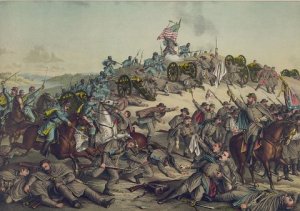Black soldiers achieved something “virtually unheard of” at the Battle of Nashville in 1864
Posted December 16th, 2014 by James DeWolf PerryCategory: History Tags: Battle of Nashville, Civil War, Emancipation, Emancipation to Equality, U.S. Colored Troops
 Today marks the 150th anniversary of the Battle of Nashville, which, between December 16-17, 1864, broke General John Bell Hood’s Confederate Army of Tennessee and left Tennessee in Union hands for the duration of the war.
Today marks the 150th anniversary of the Battle of Nashville, which, between December 16-17, 1864, broke General John Bell Hood’s Confederate Army of Tennessee and left Tennessee in Union hands for the duration of the war.
In a military sense, the 13th United States Colored Troops, despite their bravery and sacrifice on the first day of the battle, “contributed nothing to the Union victory.” Yet this African American regiment achieved something “virtually unheard of in the war” with their courage and sacrifice: they “not only earned the awed respect of white Union troops who witnessed their efforts; they also garnered heartfelt praise from an opposing Confederate general in his official report.”
The 13th U.S.C.T. was comprised of 20 officers and 556 men, most of whom had been enslaved in northern Tennessee until Union forces arrived in 1862. Ordered to assault Overton Hill during the battle, after many white Union regiments had failed, the 13th U.S.C.T. was quickly slaughtered by the Confederate troops defending the hill. Yet in undertaking this task as if with “a charge into hell itself,” these freed slaves, untried in fierce combat, won in their deaths the admiration of friend and foe alike.
Confederate Brigadier General James T. Holtzclaw, in command of Confederate troops defending Overton Hill, put in his official report:
The enemy made a most determined charge on my right. Placing a negro brigade in front they gallantly dashed up the abatis … and were killed by hundreds … they continued to come up in masses to the abatis, but they came only to die.
As impressive as it was for the men of the 13th U.S.C.T. to win the admiration of a Confederate general, their influence on their fellow Union troops was even more important. After all, most northerners had not been in favor of abolition when the Civil War began, and even now, had questions about whether blacks preferred freedom to slavery, much less whether they were willing and able to fight and sacrifice in the cause of freeing others. Thus is it highly significant that after a battle such as this, a Union surgeon was moved to write home:
Don’t tell me negroes won’t fight! I know better.
Also impressed was George Lewis, a Union officer with the 124th Ohio:
I never saw more heroic conduct showed on the field of battle than was exhibited by this body of men so recently slaves.
As our “Emancipation to Equality” campaign emphasizes, the emancipation of our nation’s slaves wasn’t brought about primarily through the actions of a few white elites, or even the broad mass of the northern public. Instead, emancipation was made a reality by the grassroots actions of millions, most of them free or enslaved African Americans whose determined actions brought about freedom for themselves or others, and in the process gradually altered white opinion in the North. Only in this way would emancipation be (barely) adopted as official policy by Union representatives in Congress in early 1865, as the Civil War was drawing to a close.



October 25th, 2015 at 12:20 pm
The Battle of Nashville a complete Union victory was a victory for MG Thomas and the color infantry regiments who helped save the union. God bless them.
August 12th, 2018 at 1:54 pm
Mop up duty at this point. The Confederate army these guys faced was nothing like the army of Tennessee commanded by Albert Sidney Johnston. Numbers and Commanders had been decimated. Taking nothing from the bravery of the Yankee soldiers both white and black. But as far as these so called victories of their arms go I think it’s time all you Union lovers admitted they were taking on the second string.
August 12th, 2018 at 2:23 pm
Richard, I don't dispute your assessment of the Confederate forces at this stage in the conflict.
But when seasoned officers, on both sides, describe heroic conduct and hundreds dying because they wouldn't stop, that's combat as genuine and heroic as it gets. And that was the point: as I wrote, the 13th Colored Troops “contributed nothing to the Union victory” that day.
Instead, the point is that their bravery and sacrifice deserve to be remembered … and historically, we need to remember that their actions were vital to changing hearts and minds about slavery, and about free people of color, and were instrumental in the abolition of slavery with the 13th Amendment and the civil rights gained by the 14th Amendment.
April 10th, 2019 at 1:21 pm
thanks for helping me with my school work 🙂
May 28th, 2019 at 10:53 pm
And many of those men lay in unmarked graves in the National Cemetery in Madison Tennessee.
January 11th, 2020 at 12:57 pm
They did contribute something, because their determined assault on the Confederate right drew strength from the Confederate left. If they had merely feinted, as ordered, their feint may not have drawn sufficient strength from the Confederate left.
As for the state of the Army of Tennessee, I'm not sure AS Johnston's force in 1862 is a good comparison, because that force had its own problems. A better comparison would be with JE Johnston's early 1864 army, the one that frustrated Sherman's army group through months of hard campaigning. But this begs the question, how would USCT have performed against that army, had Sherman allowed them to fight there?